Disclosure: When you click on links to various merchants on this site and make a purchase, this can result in this site earning a commission. Affiliate programs and affiliations include, but are not limited to, the eBay Partner Network
We’ve moved some things around in our caravan, so I was wondering how to work out caravan tow ball weight.
After some research, this is what I found: There’s 3 different ways to measure tow ball weight and they all need scales. This is because a caravan’s ball weight changes every time you load your van or change the amount of water in your tanks. The 3 ways work out caravan tow ball weight are:
- Using a plank of wood and a set of bathroom scales
- With a set of ball weight scales, and
- Taking your van over a weigh bridge
Here we’ll cover how to do each of these methods. Also, why it’s important to find out your caravan’s ball weight.
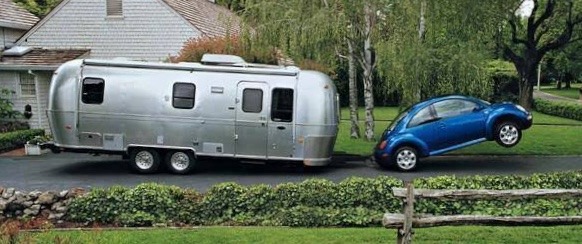
But first:
Why do you need scales to work out your ball weight?
Unfortunately:
You can’t just calculate the nose weight of a caravan (or any type of trailer for that matter)
A rule-of-thumb is that your tow ball download should be about 10% of your van’s weight…
…but you need to check your compliance plate or owner’s manual to see if they specify the tow ball download for your trailer. Some are as low as 5%, and others as high as 15%.
Now, your compliance plate might state the ball weight for your caravan. What this usually means is:
This isn’t your actual ball weight, this is usually the ball weight when your caravan is empty straight from the factory (Tare).
Think of your trailer as a see-saw:
- The wheels are the fulcrum
- You have some weight on one both sides
- One end is resting on the tyre on the ground (this is your tow ball)
Now, imagine you put a set of scales underneath the end of the see-saw that’s touching the ground:
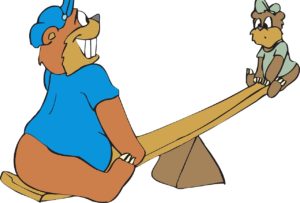
It’s pretty easy to see how increasing the weight on either end of the see-saw will change the reading on the scale.
Exactly the same thing happens on your caravan.
So some things that will affect your caravan’s ball weight include:
- How you’ve loaded your van
- If your water tanks have water in them on not
- If there’s gas in the bottles
- Where you keep your spare tyre
- Are there Jerry cans on the back of your van… and if they’re full
So if you full load up the front of your A-frame your ball weight will be heavier:
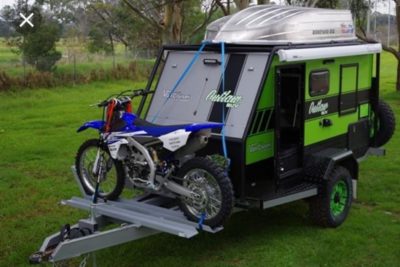
If you hang stuff off the back of your van your ball weight it acts as a counter-balance. Your ball weight will be lighter:
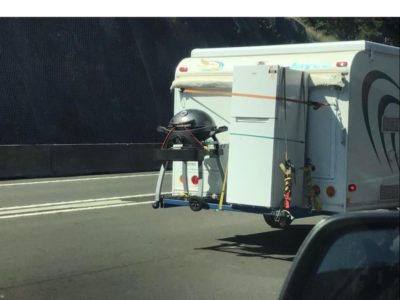
I think this is a really good (quick) video showing the difference between putting some weight on your draw bar vs. over your wheels:
How do I weigh my caravan’s ball weight?
The best option: Weigh your car and caravan on a weigh bridge
This is the most accurate option. Not only that:
This is the best option to find your ball weight because it’s the most accurate and it’s important to know your other caravan and car weights too.
But here’s the thing: not all weigh bridges will include this weight unless you ask. So ask.
Here’s how you do it:
- With your caravan hooked up, drive you car’s wheels onto the weigh bridge. This will give you car’s weight PLUS the amount of weight the trailer is putting onto the car.
- Unhitch your van
- Weigh your car again (it’ll be lighter)
- Subtract weight of the unhitched-car from the hitched-car
For example:
If your car’s weight is 2,500 kg when it’s hitched up, and the weight is 2,300 kg unhitched then your ball weight is 200 kg.
But remember!
This is the tow ball weight based on how you’re loading it TODAY.
The moment you put gear in, take gear out, or change the amount of water you’re carrying… your ball weight will change.
Don’t forget to get these other weights too:
- Weight of caravan fully loaded (Aggregate Trailer Mass), and
- Weight of car and caravan together (Gross Combined Mass)
If you’re unsure about these weights check out our other article: How to Work Out Caravan Towing Weights [A Simple Explanation]
Unfortunately getting to weigh bridge isn’t that easy of some people. And, the platform can be raised at some weigh bridges so this method won’t work.
So what do you do?
The simple but effective option: Use ball weight scales
This is a great option because:
- It’s quick and easy
- They’re small enough that you can carry them with you
- You can check your ball weight after you change how you’ve loaded your van
- They’re cheap and reliable*
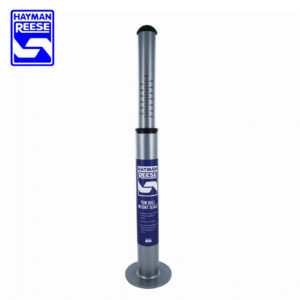
These are simple to use:
- Make sure your wheels are chocked
- Wind up your jockey wheel
- Put the ball weight scale under your coupling
- Slowly wind down the jockey wheel
- Read the weight off the side of the scale
Job done. Now, when you change how you’ve loaded your van you can see the impact.
[You can also experiment with things like how full or empty tanks affects your ball weight]
But here’s the thing:
The cheaper ball weight scales have been know to vary by as much as 30 kg
So it’s important that you get a decent set. A cheap set will cost about $40-50, while a decent set $70
I’d recommend getting a decent set like the ones from Hayman Reese. The once off cost is totally worth it. They’re cheap here on eBay
The DIY option: Use a set of bathroom scales
This isn’t as accurate, and will mean you have to mess around a bit.
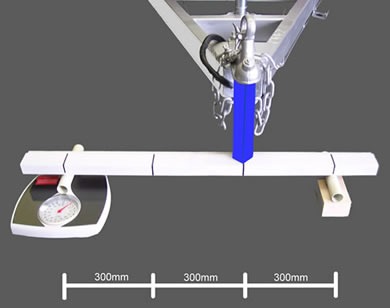
Picture courtesy of Swift Caravans
But hey, if you’re in a hurry and you don’t have time to get a set of ball scales… I guess it’s better than nothing.
You’ll need:
- A strong piece of wood (how you work that out?!)
- Some pavers (not bricks)
- A set of bathroom scales (with a limit of over 100 kg)
Here’s how you do it (without breaking your scales):
- Check to make sure your scales have enough range
- Measure the piece of wood into thirds
- Make sure your wheels are chocked
- Wind up your jockey wheel
- Place wood so that the coupling of your caravan is directly over one of the 1/3 markers
- Place the scales underneath the far end of the plank (important)
- Put enough pavers under neath the wood to lift it up so that the coupling will be resting on the wood at the same height as it sits on tow ball
- SLOWLY lower the jockey wheel
- Multiply the scale reading by 3x
For example:
If the scales read 70 kg, then your ball weight is 210 kg.
Now it’s important that you do this slowly… bad things can happen. The wood might snap. The pavers might crack. Scales collapse.
So yeah: I’d recommend getting some ball weight scales (see above).
They’re cheap and designed to do this.
Why do I need to know my caravan’s ball weight?
It’s important to know your caravan or camper’s ball weight for a few reasons.
These are to do with safety, wear and tear on your car, and not voiding your insurance.
Oh, and there’s not breaking your van’s A-frame:
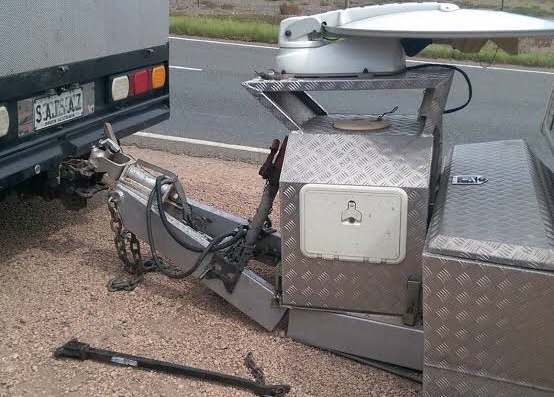
1. Having the correct ball weight keeps you safer
If your ball weight is too heavy? This can put a lot of weight on the back of your car. If it’s taking weight off the front of your car’s wheels, then this is a bad thing: Your front wheels do the steering, and are mostly responsible for braking.
If your ball weight is too light, this can lead to trailer instability. I’m sure you’ve seen this video before demonstrating the effect of towing weights, load placement, and towing stability:
2. Have the correct ball weight takes less strain off your car
If your ball weight is too heavy, then this places more stress on your car’s rear suspension as well as the tow bar.
3. The wrong tow ball weight can be illegal
Our Pajero is rated to have a tow ball download of 250 kg. Since our caravan’s ball weight is 220 kg (and can be as high as 240 kg)… I really need to pay close attention to how it’s loaded.
4. The wrong ball weight may void your insurance in case of an accident
One of the first things an insurance company will do after an accident is weigh your car and van. If the recommended tow ball download for your van is given as 10%… and yours is 15%? You might have a hard time with your claims.
But, even if your nose weight is correct for your van, doesn’t mean it’s correct for your car. Using our example my van will be fine if I had a tow ball download of 260 kg… but it’d make my car non compliant.
Summary:
It’s important to know what your caravan’s tow ball weight should be.
To find out what your ball weight actually is, you need scales…
…because it will change every time you change the load in your van. This relates to both how you load it and how you use and store water.
The most simple and effective method is a decent set of tow ball scales (even the decent ones are cheap from eBay)
Otherwise check out: Should You Tow a Caravan With Full Water Tanks?

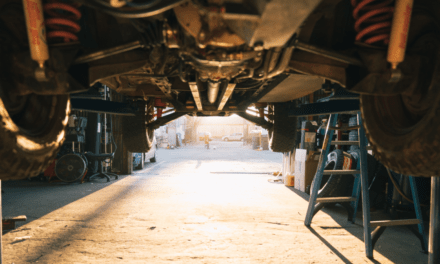

![What Can I Use to Clean My Caravan Water Tank? [Good, Bad, Dangerous]](https://abigpeacheyadventure.com.au/wp-content/uploads/2019/09/What-can-I-use-to-clean-my-caravan-water-tank-440x264.png)

Hi, thankyou for this site…love it! Even bought a book from you guys …Oh, and the tow ball scale thingy from hayman Reese.
My question for you is….
The specs for my 2009 Avan Euro star 685 (?) Says the unladen ball weight is 155, the TARE is 2060, ATM 2460. The actual ATM is 2505 without our stuff….I’m guessing due to 4xsolar panels, battery 80kg water weight.
Can you please confirm the ball weight is 240 max? Thanks. Carrie
Hi Carrie, the only way to determine this is to measure the ball weight, because it depends not only on the load you put in the van, but where you distribute that load.
With a tare weight of 2060 kg you have a 400 kg payload capacity, of which no more than 85 kg (240 kg – 155 kg) can go onto the towball. The more load you put towards the front of the van, the greater the proportion of that load will be on the towball.
Very informative will pass this around